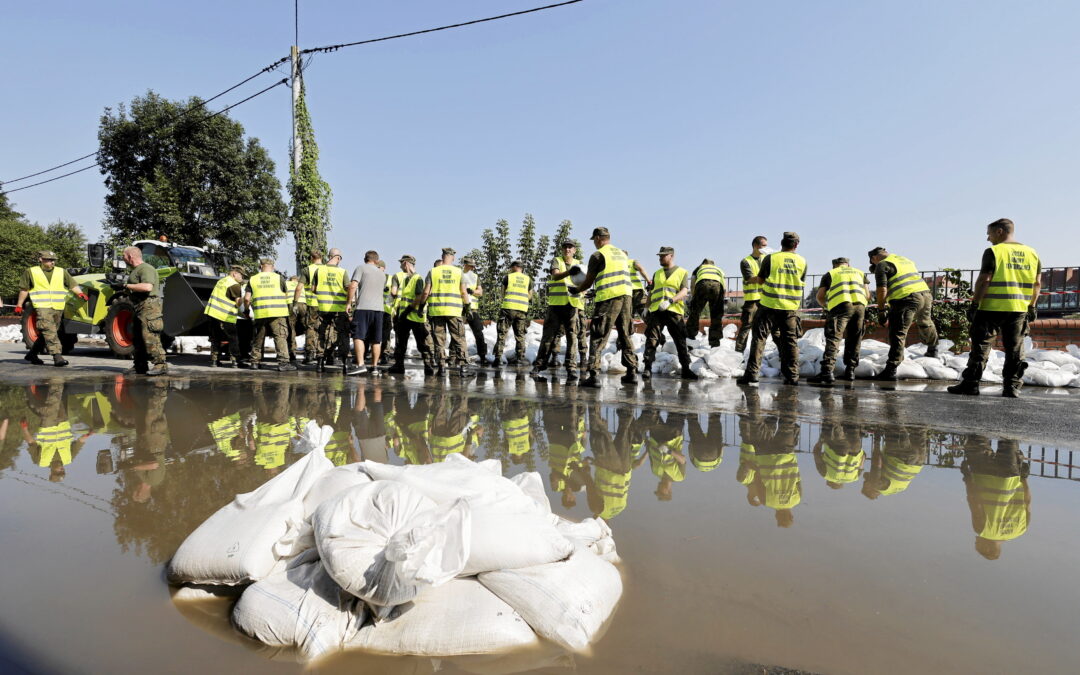By Jakub Jaraczewski
In response to ongoing major floods in the southwest of the country, Poland has for the first time in history introduced a state of natural disaster, one of three extraordinary legal tools provided in the 1997 constitution.
The measure was introduced for a period of 30 days on 16 September in parts of the provinces of Lower Silesia, Opole and Silesia. The following day, it was extended to cover further areas in those same provinces as flooding worsened.
What are the legal implications of a state of natural disaster?
In a legal context, these extraordinary measures transform elements of the constitutional legal framework to accommodate an appropriate state response to the threat. A crucial aspect of all three measures is that their introduction gives the authorities the power to limit the protection of human rights and freedoms as deemed necessary to deal with an emergency.
Southern Poland has been hit by major flooding, which has so far claimed one life.
The prime minister, on a visit to the worst-affected area, appealed to residents to obey evacuation orders https://t.co/bsdRiVfo59
— Notes from Poland 🇵🇱 (@notesfrompoland) September 15, 2024
The government may introduce a state of natural disaster through a decree, meaning it does not have to go through parliament. Its aim is to “prevent or remove the consequences of a natural catastrophe or a technological accident exhibiting characteristics of a natural disaster”.
The decree can be applied to parts or the entirety of Poland for up to 30 days. This period can be extended with the consent of the Sejm, the lower house of parliament, without any specified limits on the length of the extension. In practice, this allows a state of natural disaster to persist for as long as the authorities deem necessary.
The introduction of a state of natural disaster has several significant consequences regarding the constitutional framework. The constitution, election laws and extraordinary measure laws themselves cannot be amended while it is in place. This aims to ensure that there can be no attempt to alter basic laws or to tinker with the framework of extraordinary measures during an emergency.
The government has announced that it will declare a state of emergency in response to major flooding that continues to devastate parts of southern Poland.
Warsaw has also appealed to the EU for help in dealing with the disaster https://t.co/smQAsE1Rc9
— Notes from Poland 🇵🇱 (@notesfrompoland) September 16, 2024
Furthermore, during an extraordinary measure and for 90 days after its end, the term of the Sejm cannot be shortened, nor can a nationwide referendum or elections be held, and terms of respective offices are extended. Local elections may be organised, but only in those areas unaffected by the extraordinary measure.
These provisions, meant to ensure that an emergency cannot be exploited for political gain, are unlikely to come into play as no nationwide elections in Poland are scheduled in the upcoming months, and no referendum has been called.
What does a state of natural disaster mean in practice?
Of greater practical importance are the provisions that allow the government to limit the protection of selected human rights and freedoms. These include economic freedoms, personal liberty, protection of home and private property, freedom of movement and labour rights. Those who flout these restrictions may be found criminally liable.
All of those limitations speak to the need to effectively counteract a disaster or catastrophe, a process that frequently clashes with the rights and freedoms of the individual. People must be evacuated from endangered areas – sometimes against their will, as some will inevitably ignore the danger or try to stay home at all costs.
Poland has deployed military police equipped with night vision and thermal imaging to protect areas evacuated due to ongoing floods from looters.
The defence minister says anyone caught stealing from victims of the disaster “will be severely punished” https://t.co/Wrog6aMDSY
— Notes from Poland 🇵🇱 (@notesfrompoland) September 17, 2024
Private property will inevitably be damaged or destroyed, not just by the elements but also by rescue efforts, and in some cases, private premises, vehicles or machinery must be commandeered by rescuers.
Work obviously cannot continue normally in affected areas, but the workforce might also need to be diverted from its usual activities to help fight the danger. The law provides for obliging individuals and businesses to carry out specific work, hand over property or equipment, or to participate in rescue activities.
The possible interventions concerning economic freedoms go as far as allowing the government to regulate the supply of specific goods and services and their pricing, which Prime Minister Donald Tusk has said will be implemented “if necessary”.
The government decree that introduced the state of natural disaster on Monday outlined the measures to be employed: the obligation to vacate or secure residential dwellings and other premises, evacuation orders, and orders or prohibitions of stay or movement in selected areas.
Sorry to interrupt your reading. The article continues below.

Notes from Poland is run by a small editorial team and published by an independent, non-profit foundation that is funded through donations from our readers. We cannot do what we do without your support.
Will the government face compensation claims owing to the restriction of freedoms?
Polish law provides the possibility of compensation for damages incurred by natural disasters and for recovering economic losses incurred by human rights and freedoms limitations during an emergency. Thus, those affected by the abovementioned measures should, in principle, receive due compensation.
Such procedures will almost certainly lead to some court cases, as some individuals and businesses will find their requests for reimbursement refused, covered in an unsatisfactory way, or processed too slowly. Under normal circumstances, such clashes would be left to independent courts to resolve.
However, Poland is still experiencing a rule of law crisis, with close to a quarter of its judiciary composed of so-called “neo-judges”, including ones in the Supreme Court.
These judges were appointed or promoted on the recommendation of the National Council of Judiciary (KRS) after it was overhauled by the former Law and Justice (PiS) government in a manner that various European and Polish court rulings have found rendered it no longer an independent body.
A Polish court has for the first time removed from adjudication judges appointed through a state body rendered illegitimate by reforms introduced under the former PiS government https://t.co/9u3rx4NqrB
— Notes from Poland 🇵🇱 (@notesfrompoland) August 8, 2024
In addition, the Constitutional Tribunal, a body tasked with reviewing the constitutional compatability of laws, including government decrees, has also come to be seen as being under the influence of PiS and contains judges whose appointment has been found to be unlawful by other courts.
The problematic status of many judges and the legal chaos this has already created threaten to make legal settlements regarding the state of natural disaster even more difficult.
Why has a state of natural disaster never before been introduced?
The introduction of the state of natural disaster this week constitutes the first time this emergency measure has been triggered in Poland. The catastrophic “flood of the millennium” in 1997, which also ravaged southwest Poland and led to major flooding in the city of Wrocław, took place before the current constitution and its provisions on emergency measures came into force.
In 2010, a significant flood affected the same area, but a state of natural disaster was not invoked. Most controversially, the then PiS government refused to trigger a state of natural disaster during Covid, despite those who drafted the constitution envisioning it to be used in the case of a dangerous viral disease outbreak.
Poland's coronavirus restrictions are unconstitutional, unlawful and risk years of legal chaos, argues @MikolajMalecki.
The measures were among the toughest and earliest in Europe, and have led to thousands of fines being issued without proper legal basis https://t.co/DEhCHP71kn
— Notes from Poland 🇵🇱 (@notesfrompoland) April 18, 2020
This decision drew widespread criticism, as the government relied on fighting the pandemic using a piecemeal array of individual laws, some profoundly limiting human rights and freedoms.
Critics pointed to an apparent desire by the then ruling majority to avoid postponing the 2020 presidential elections, as the incumbent, Andrzej Duda, was polling strongly at the time. Invoking a state of natural disaster would have forced the delay of those elections.
As such, Poland is entering uncharted waters with its first use of a state of natural disaster. Multiple provisions of the constitution and specific laws will be used for the first time. This will provide an important test of whether the constitutional framework is adequate to deal with the consequences of disasters caused by extreme weather, something that is unfortunately likely to occur more frequently in the coming years.
Main image credit: Patryk Ogorzalek / Agencja Wyborcza.pl




















